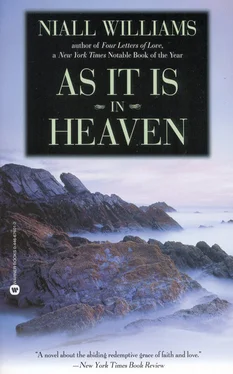There were forty people for the concert. He sat in the third row in the aisle seat and did not take his eyes off Gabriella from the moment she entered in a blue dress.
While she bowed the thousand notes, she saw and heard nothing else, and neither the polite applause nor the coughing fit that took one of the elder Donoghue sisters moved her from the far country of the music. It was only between the pieces that she sometimes glanced down at the audience, turning the sheet music with her bow hand and looking briefly at the faces of those astonished to have found such a musician playing in the hotel. It was in those moments that she looked for the face of Stephen Griffin and found him there in the third row looking at her. She saw him and he looked away, and before she had drawn breath to begin the Kreisler, she was already moved by him. A quality of longing in his look pierced her, and as she pressed into her chin rest, she had to steady herself against the suddenness of feeling. (Although she did not know it yet, there was common ground between them, for Gabriella Castoldi shared with Stephen Griffin the expectation of failure and the familiarity of despair. Neither did she realize yet that grief is a kind of glue, too, that the essence of humanity is this empathy, and that we fall together in that moment of tenderest perception when we see and feel each other's wounds and know another's sorrow like a brother of our own.) She did not think of this yet. She played the Kreisler. She played the Elgar after that, and did not look down at him again until the concert was over. Then, as unexpectedly as life, Gabriella Castoldi walked down amongst the chairs and the departing audience to Stephen Griffin and asked him if he would like to walk out into the fog with her.
 When the salt-smelling letter of Eileen Waters arrived at his house, demanding to know the whereabouts of Stephen and stressing his responsibilities to his students, Philip Griffin realized the love affair must be progressing. He felt the pain less keenly that morning and thanked God for keeping their bargain while he skipped the first tablet of his day. By eleven o'clock the pain that was overdue had still not arrived in his insides, and he stood by the front window looking out on the tranquillity of the suburban street for a sign of anything changed in the world. But there was nothing. The chestnut tree was bare and hung its limbs in the still air above the green pentagon of lawn. A few women and old men walked by to the shops.
When the salt-smelling letter of Eileen Waters arrived at his house, demanding to know the whereabouts of Stephen and stressing his responsibilities to his students, Philip Griffin realized the love affair must be progressing. He felt the pain less keenly that morning and thanked God for keeping their bargain while he skipped the first tablet of his day. By eleven o'clock the pain that was overdue had still not arrived in his insides, and he stood by the front window looking out on the tranquillity of the suburban street for a sign of anything changed in the world. But there was nothing. The chestnut tree was bare and hung its limbs in the still air above the green pentagon of lawn. A few women and old men walked by to the shops.
“Well,” he said at last to his wife. “This might go quicker than I thought, love.” And then, with a sudden but muddled enlightenment that perhaps Christmas was to be somehow significant, that patterns ancient as creation make meaning of our days, he added, “I'll go to Toby Madigan's for cloth. I'll make him a suit.”
And so that morning, without his painkiller, Philip drove into Dublin and left God the extra bonus of £345 behind the railings, before walking over to the brown dust-snowed premises of Tobias Madigan, & Son. It was Son he dealt with. Son was already a grandfather, but his son had decided to be the retail manager of a branch in a cheap clothing chain and the old shop had been left to fade into the line of other buildings that were the ragged endpieces of the street's memory moments before renovation took it away. Son answered the door when Philip knocked. He was all neck wattles and loose skin; he had an air of sagging, as if he were a cloth man or his bones had already preceded him into the next life. He knew Philip Griffin when he saw him and raised the shallow purses beneath his watery eyes as a greeting. “Ah, Phil,” he said, “long time.”
When the tailor told him what he wanted, Son drew him into the back room, where they walked across newspapers that Time had worked into the floor and reached the bolts of material that Son brushed left to right with a flimsy hand. He was famous once in Dublin for the quality of his cloth, in the vanished era when such things mattered.
“What about some of this?” he said, drawing out a yard of navy-blue material that was the fabric he had sold to his last customer, the minister, almost two years earlier and before his appearance at the first Tribunal.
Philip felt it for texture and made a few short tugs between thumb and forefinger, as if teasing the cloth for weakness, the way life does a man. He held the material sideways to the slant of low light that fell diffused through the grimy window and then said he would take it. When Son was measuring and cutting, Philip waited in the front room, which had once been busy enough to keep three salesmen when Prendergast had sent the young tailor across the river to buy more cloth. He stood where he had stood as a young man and felt the heaviness of the years. Then, as he took the cloth, folded in brown paper wrapping and tied with twine, he felt come on again the sharp pain of the cancer. He left the old shop quickly, saying goodbye to Tobias Madigan's son as if not wanting to delay the old man's imminent departure into ghosthood and squeezing gently the offered palm of his hand like a cool white handkerchief damp with tears.
The pain turned inside him as he walked back to his car. It seemed larger than his insides, in the same way that the immensity of our sorrows dwarfs the smallness of our hearts. His breathing was lumpy, his throat was swollen inwards, and he could not draw inside him the cool air of the December noon. He had to lean against a wall.
Oh God, he thought, not now. Not here. He saw his hand against the grey building, how it appeared like a freckled fallen bird, useless, trembling with last life. He turned and saw people walking past him. He imagined with brief cruelty against himself the thought of those who had found his money now passing by and his dying against the wall and falling on the cloth of Stephen's unmade suit. His faith wavered and buckled like thin metal in heat; was there no pact after all? Was nobody listening? He reached the knot of his tie with his left hand and pulled it back for air. His right hand clutched at his stomach. He was going to die right there, and then suddenly, like light breaking, the pain eased once more.
He made it to his car and drove home for his lunchtime painkiller.
In the afternoon, when the medication had twirled the air about him into a white fuzz like candy floss, Philip opened the cloth out onto the carpet in the front room. Then he lay down upon it. His son was nothing like himself, they were different as tweed and cotton, but in lying on the blue cloth the father could imagine its shape upon his son. He knew Stephen's dimensions chiefly in relation to his own and held out invisible extensions of his arms to the six extra inches in length that measured the unreachable hands of his son. He marked the cloth without use of a tape measure, turning over on the ground and bringing his face so close to the fabric that he could smell the shop forty years earlier, when he had gone there as an apprentice. To save his ruined muscles Philip rolled over to get up. This would be the last suit he would make, and in the silence of the empty house on that darkening December afternoon, he wished to make it better than any he had before. This was to be the last testament of his skill and craft, the final expression of the many years spent cutting and shaping cloth, suiting the city's men in the good-looking fabrics that not only dressed the body but, through some ancient magic of tailoring, bestowed grace, too. This was to be the last one, the last Philip Griffin, and he took the thirty-year-old scissors and slipped it like a surgeon into the thin veins of the cloth. He did not snip; he moved the scissors with an even confidence, making the first cuts with that quality of assurance that he knew transferred itself directly into the finished garment.
Читать дальше

 When the salt-smelling letter of Eileen Waters arrived at his house, demanding to know the whereabouts of Stephen and stressing his responsibilities to his students, Philip Griffin realized the love affair must be progressing. He felt the pain less keenly that morning and thanked God for keeping their bargain while he skipped the first tablet of his day. By eleven o'clock the pain that was overdue had still not arrived in his insides, and he stood by the front window looking out on the tranquillity of the suburban street for a sign of anything changed in the world. But there was nothing. The chestnut tree was bare and hung its limbs in the still air above the green pentagon of lawn. A few women and old men walked by to the shops.
When the salt-smelling letter of Eileen Waters arrived at his house, demanding to know the whereabouts of Stephen and stressing his responsibilities to his students, Philip Griffin realized the love affair must be progressing. He felt the pain less keenly that morning and thanked God for keeping their bargain while he skipped the first tablet of his day. By eleven o'clock the pain that was overdue had still not arrived in his insides, and he stood by the front window looking out on the tranquillity of the suburban street for a sign of anything changed in the world. But there was nothing. The chestnut tree was bare and hung its limbs in the still air above the green pentagon of lawn. A few women and old men walked by to the shops.









